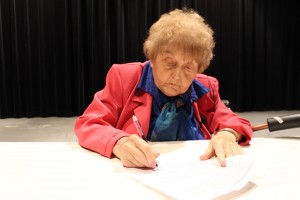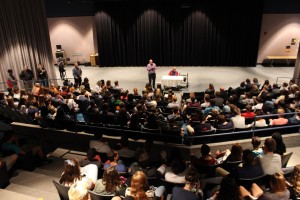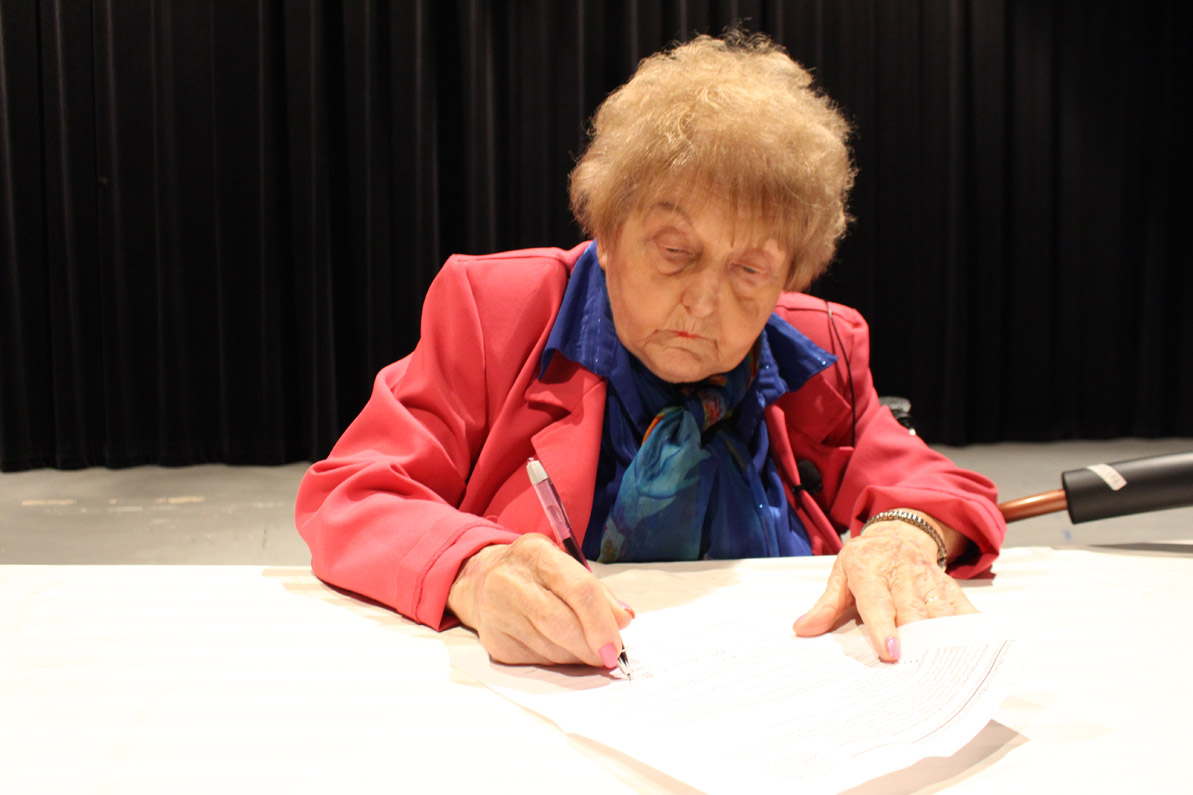Nazi Holocaust survivor speaks to Penn Students
Eva Kor, a survivor of the Nazi death camp Auschwitz and the experiments of convicted Nazi war-criminal Doctor Josef Mengele, spoke to Penn students on Friday, May 13th.

She began the day by talking about her arrival at Auschwitz. “It was the most confusing place I have ever been. I am ten years old.” Minutes later she explained how she was separated from her other siblings, and how she would never see them again.
At a place called the “Selection Platform,” she was separated from her mother, and she lamented, “I never even got to say good-bye. I did not know that would be the last time I would see her.”
Of that platform she added, “millions of people were ripped apart from their families forever.”
Mengele twins, such as Eva and Miriam, were subjected to experiments that involved many injections of unknown fluids. They were also subjected to experiments that involved freezing, hypothermia, genetics, infectious diseases, interrogation, torture, high altitude, experimental drugs, and sterilization.
These injections caused death and sickness among the victims of the experiments. Eva was subjected to these deadly experiments and to this day does not know what was injected into her.
When she got sick as a ten-year old, she was separated from her twin sister Miriam and landed in the camp hospital. “My only clear memory of that two week period was crawling across the barracks floor to get water from the faucet,” she says of her time in the hospital. She survived the sickness and reunited with her sister. Years later, her sister told her that if Eva had died, Mengele would have killed Miriam to conduct an autopsy and other post-mortem experiments.

Much of her talk centered around the relationship she shared with her twin Miriam. When Miriam was having children in the 1980s, her kidneys failed, and to save her sister, Eva donated one of her kidneys.
Despite the transplant, however, Miriam died in 1993, while Eva was living in Terre Haute, Indiana, and Eva explained in her talk how she felt when her sister died. ”I wanted to attend her funeral..I wanted to say goodbye to my sister,” and then, to add levity, she added, “I wanted to say goodbye to the kidney I had given her.” Eva attributes her sister’s death to the injections given to her by Josef Mengele.
Eva had a request to speak at Boston college about Nazi medicine. The speaker asked Eva to bring a Nazi doctor. Astounded by this request, Eva responded, “Where on Earth do you think I can find one of those guys? They don’t advertise in the yellow pages.”
After a good bit of looking, Eva found a Nazi doctor named Dr. Hanz Munch. Munch was not her Nazi doctor and did not have knowledge on her experiments. Eva decided to ask Munch if he ever walked by the gas chamber and looked inside. The doctor responded sadly to Eva’s question with, “This is my problem, this is the nightmare that I live with every single day of my life.”
He continued to described the routine that happened for the gas chambers and how he was the man who looked inside the peephole of the gas chamber. The doctor described how the Nazis told the Jews that they were going to take a shower. The Jews packed inside the gas chamber and the doors closed, trapping the Jews inside.
The doctor described how when he looked inside the chamber through the peephole he saw the gas canisters fall from the ceiling and the gas rise among the feet of the Jews. The gas rose up and the innocent people climbed on top of each other into mounds, attempting in vain to avoid the deadly gas. Eventually, the gas reached the top on the mounds and they all suffocated and died. When all the Jews had suffocated the doctor signed a single death certificate, containing only the number of people that had died.
Eva wanted to thank Munch for giving her this information, even though she knew it was unusual for her to thank a Nazi doctor after her experiences at Auchwitz. Eva struggled to come up with an idea until she decided that the best way to thank him was to write a letter of forgiveness. It took Eva four months to to write the letter and she discovered something that changed her life: forgiving Dr. Hanz Munch and everyone who has done her harm freed her from the clutches of Auschwitz. Eva explained during her talk that forgiveness has helped clean her slate and she now advocates for forgiveness.
Eva Kor learned three lessons from her time at Auschwitz concentration camp and travels around the United States to teach these lessons. Eva’s lessons are to never give up, do the best you can with your life, and to learn how to forgive anyone who has ever done wrong to you. According to Eva, these are the life lessons that help make her a better, happier person and if everyone follows them, they will be happier individuals.
To see the full speech and interview check out PNN Features on YouTube.
[Best_Wordpress_Gallery id=”2″ gal_title=”Eva Kor”]

